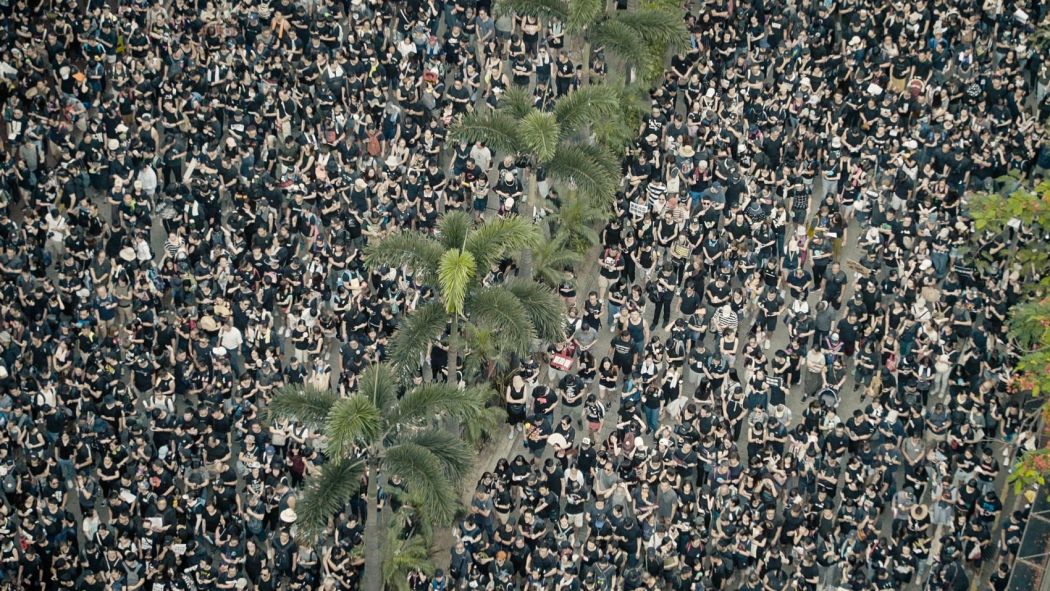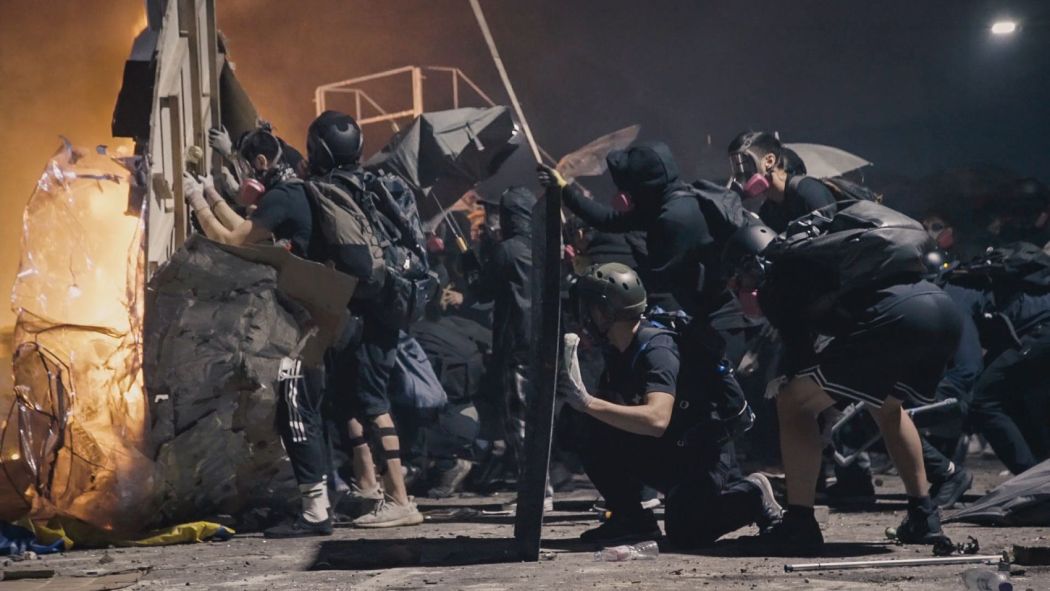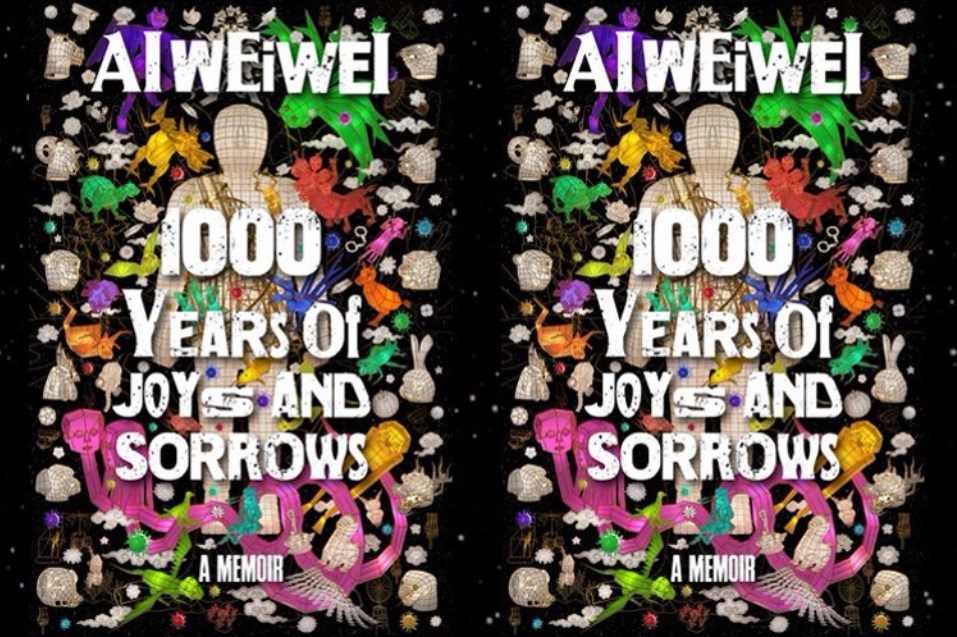Hong Kong artists can still find ways to express themselves despite the challenges posed by growing political censorship, leading Chinese dissident artist Ai Weiwei believes.
After years of delay, the city is set to open its M+ museum, touted as Asia’s first global museum of contemporary visual culture, on November 12 as part of the government’s bid to become a global arts and cultural hub.

But fears of increasing censorship under the national security law have cast a shadow over the launch. Already, pro-Beijing voices have called for controls on any artwork that may endanger national security and artists have left the city, citing the need for greater freedom.
The museum’s online collection currently features 28 of Ai’s works, donated by Swiss collector Uli Sigg. One photograph from his “Study of Perspective” series, which features the artist pointing his middle finger at cultural monuments across the world, is currently under “government review.” It shows the artist’s middle finger pointed at Beijing’s Tiananmen Square.
“Censorship of artworks is nothing new,” the artist told HKFP in a wide-ranging email interview in which he also expressed strong support for jailed activists. “It is more common under an authoritarian regime…[but] it is important to remember that political censorship does not happen under authoritarian regimes exclusively.”

“It is not only in China and Hong Kong that my works encounter restrictions, but also in mainstream film festivals or exhibitions in the West.”
“M+ Museum has no alternative but [to make] such an adjustment because as a Hong Kong art institution, they have to operate under the Hong Kong government and comply with the spirit of the National Security Law. If they do not, M+ Museum would not even exist.”
‘Precious efforts of the human spirit’
Jitters among Hong Kong’s artistic community about the security law, which critics say has stifled political dissent, have prompted at least one high-profile artist to leave the city. Almost a third of the directly-elected committee members of the government-funded Arts Development Council have resigned.
Ai said he still believes Hong Kong artists can rise to the challenge and find a way to create amid the uncertainty and fresh obstacles.

“Freedom of expression needs to appear amid struggles. I believe that Hong Kong’s condition today gives Hong Kong artists and their artistic expression a new challenge. Artists who can face this kind of challenge would be real artists,” he told HKFP.
If Hong Kong’s 2019 protests attest to people’s awakening, the aftermath manifests authoritarianism’s extreme irrationality, and rejection of any negotiation or discussion.
ai wei wei
“When contemporary Hong Kong artists amid the struggles today find their own language, this would [be] the emergence of their artistic expression.”
Freedom of expression, vital for artists, should continue to find new ways to exist under increased scrutiny, Ai said. “Freedom of expression is the first and foremost condition for art being art, but freedom of expression itself is about looking for an outlet in the midst of struggles.”
“Art would not be art if it cannot be done in the face of tyranny… Those that cannot be done will die out. We can clearly see that the artworks which fight for freedom are precious efforts of the human spirit.”
“Those artworks which cannot fight for freedom, undertake the responsibility bravely, or discover their own language are only mediocre decorations.”
Aftermath
When the mass anti-extradition bill demonstrations broke out in mid-2019, Ai had hailed the protests as “beautiful” and the many young protesters as “clever and brave.” He later documented the city-wide pro-democracy protests in his film Cockroach, in reference to the derogatory nickname police used for the black-clad protesters.

In response to the protests, Beijing in June 2020 imposed a sweeping national security law which authorities insist was necessary to restore stability. The law has since been used to arrest and charge scores of pro-democracy politicians and activists, dozens of whom have been denied bail pending trial.
I want to say to those who are falsely and unjustly charged that they are standing on the right side of history. The authoritarian regime will not be able to erase their glory.
ai weiwei
Ai’s film, which captured key scenes and figures of the street protests, is described as “a visual record of the final moments of an independent, democratic Hong Kong.”
“If Hong Kong’s 2019 protests attest to people’s awakening, the aftermath manifests authoritarianism’s extreme irrationality, and rejection of any negotiation or discussion,” Ai told HKFP.
He nonetheless still believes that those who demanded democracy in the face of what he calls tyranny have already won.
“They have pushed this historical progression and political demands to a very high position. Hong Kong citizens and their movement have won, but authoritarianism is unscrupulous, whose response has proven that Hong Kong made them feel afraid.”

“In fact, Hong Kong’s glory and true victory are going to be defined by history and not by the regime,” Ai wrote. “From a historical perspective, people won’t forget the price that Hongkongers have paid for Hong Kong’s own independent and free spirit, and the price they pay for democracy, dignity, and freedom in the world.”
When asked how Hongkongers can keep fighting for democracy in a climate of fear, Ai described the cause as an “eternal struggle.”
“It is exactly because of the existence of the Chinese government, or any authoritarian regime that individual or collective fight becomes a meaningful act. These are inseparable. While fighting for democracy and freedom, there is no one who wins outright. It is an eternal struggle, democracy against authoritarianism, and individuals against power.”
More than 10,250 people have been arrested since the protests broke out in June 2019. The artist and activist had a message of hope for those behind bars.
“I want to say to those who are falsely and unjustly charged that they are standing on the right side of history. The authoritarian regime will not be able to erase their glory. Every bit of their efforts has defended the principles of justice and fairness, not only for themselves, but also for the weak and the forgotten, whom they do not know in person. I am very proud of them.”
‘Ability to endure’
The “eternal struggle” between democracy and authoritarianism continues to inform the artist’s life and work in exile. Ai, who fled China to Germany in 2015, four years after being secretly detained for 81 days without charge and having his passport confiscated by Chinese authorities, is still subject to Beijing’s influence.
Last week, he said the Swiss bank Credit Suisse had decided to close his foundation’s accounts because of his “criminal record.” Earlier this year, the bank’s chief financial officer said it would increase its onshore presence in mainland China.

Commenting on the sudden closing of his accounts, Ai recounted an anecdote from his time in Chinese detention.
“When the Chinese government interrogated me, they created false accusations such as tax evasion, and among these accusations, the most important one was ‘inciting subversion of state power’. But they were not willing to talk about this accusation. They wanted to use other false accusations to hide this one.
“They also told me clearly that they were going to ruin my reputation. I asked them, how do you ruin my reputation? They looked at me and answered in a serious manner: ‘is tax evasion a very serious crime in Western countries?’ I said that in my experience tax evasion is like embezzlement of public resources, which is of course a crime and a moral misconduct. In fact, they had thought it through; they had to accuse me of a crime that the West would acknowledge as a crime… So, they decided on tax evasion.”
“I don’t find it weird because since you are dealing with people like that, you need to have the ability to endure it,” he said of the Chinese Communist Party.

“What surprised me was that a supposedly neutral bank in Switzerland closed my account which I have had for a very long time, under the pretext of this false accusation. This was very surprising to me. We all know that Switzerland claims to be neutral. At the same time, they did not give us an opportunity to explain although we argued that I was never legally arrested or prosecuted in China. Even my arrest was illegal. It was a secret detention.”
During his detention, Ai began working on a memoir of his life and his father, the revered poet Ai Qing, during the Cultural Revolution. The book, 1,000 Years of Joy and Sorrows, is set to be published in November.
For Ai, the party’s oppression caused him to become the artist he is today.
“The policemen who interrogated me in China also asked me right before the end of my 81-days of detention… ‘Ai Weiwei, without us, would you become so famous today?'”
“My answer to them was that a fighter is considered a fighter only when they face a disaster or a monster. As a matter of fact, it’s this country’s politics that created me. Without them, it is very likely that I would be a good for nothing.”
1,000 Years of Joy and Sorrows is available on Book Depository to pre-order for HK$144 with free delivery to Hong Kong. 5% goes to HKFP if you use this link.
Support HKFP | Policies & Ethics | Error/typo? | Contact Us | Newsletter | Transparency & Annual Report | Apps
Help safeguard press freedom & keep HKFP free for all readers by supporting our team

LATEST FROM HKFP
HKFP has an impartial stance, transparent funding, and balanced coverage guided by an Ethics Code and Corrections Policy.
Support press freedom & help us surpass 1,000 monthly Patrons: 100% independent, governed by an ethics code & not-for-profit.










